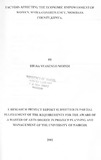| dc.description.abstract | Women continue to lack access to and control over resources, the purpose of this research project therefore was to identify the factors influencing the economic empowerment of women in Mvita Constituency in Mombasa County. The factors under study were education, self help groups, political representation and cultural practices. The study utilized both primary and secondary sources of data. Secondary data was obtained from scholarly books and journals, reports and proceedings of international conferences and seminars.
Primary data was obtained by administering questionnaires to respondents; an interview schedule was also utilized when gathering information from the key informants. The research used the survey research design in order to capture the various characteristics of the population. Cluster sampling was utilized by selecting households from Mvita constituency, 90 individual respondents were then picked from each household using simple random sampling. 10 key informants were selected using purposive sampling.
The data obtained was analyzed using SPSS and presented in the form of percentages and tables, standard deviation, Pearson correlation and chi square. The literature review was found to be in agreement with the findings of the study that portrayed that women continued to lack the access and control of resources in the society. This indicates that they had low income levels and were often excluded from the major decision making machinery. Their low economic status was further hampered by low levels of education; therefore, women lacked even the basic skills to enable them to improve their standards of living.
The findings also indicated that cultural practices and traditions perpetuated the view that women are less superior to their male counterparts. The study found that male supremacy and early marriages were some of the negative cultural practices that were rampant in the community. Political representation by women was also influenced by their lack of economic resources often needed to vie for political positions and cultural stereotypes. Self help groups were found to be beneficial because they not only enabled women to pool their resources and save, but also provided easy access and collateral for loans.
Among the recommendations of the study was to create watchdog mechanisms in order to monitor the community on the high dropout rates among the girl child. Mainstreaming of self help groups should be done to enable their transition from informal groups to formal groups in the society. The study noted that is important for a similar research to be conducted on other counties to establish other factors that affect economic empowerment of women. | en_US |

